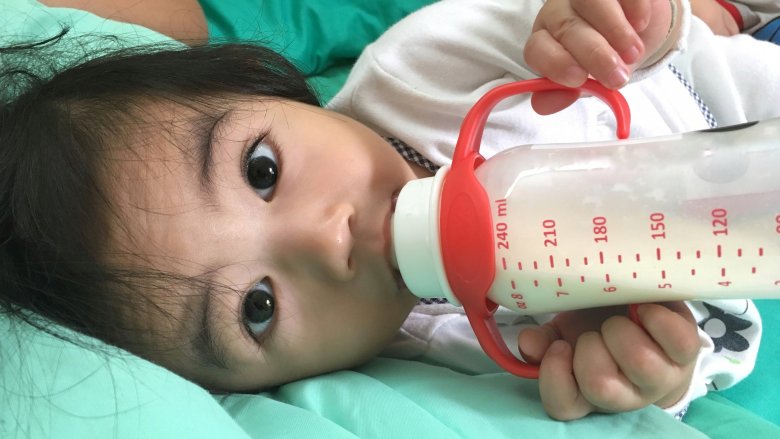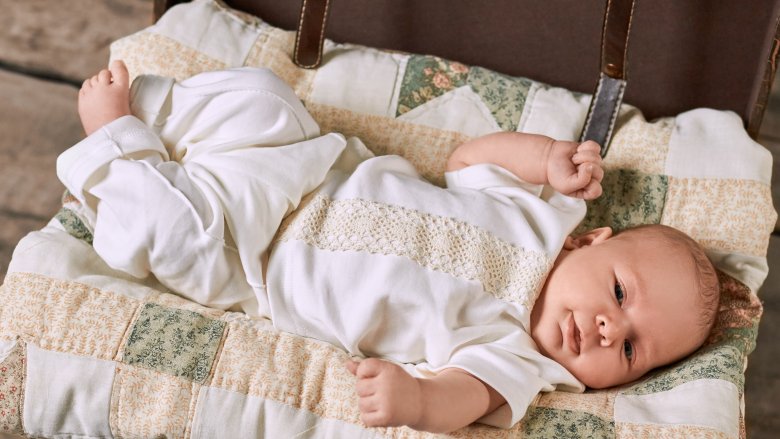Things You'll Wish You'd Known Before Having A Baby
Having a baby is possibly the biggest change you'll ever experience in your life. There are so many unknowns and a steep learning curve. Of course, it will all be worth it because you'll have a new child to love. And you don't have to go into it completely blind. I went to moms and experts to find out what they think you should know before you have a baby.
Setting boundaries is essential
You probably already had to set boundaries when you were pregnant and everyone felt like they had permission to touch your belly, so you'll be prepared to set a few more once you've had your baby.
Christina Moreland, mom of two, and author of Secrets of the Super Mom: How to Be a Super Mom Without Losing Your Super Self in the First Two Years told me, "Right after you have a baby, it seems everyone else feels they are entitled to see, touch, grab, and have access to your breasts. I personally was never comfortable feeding around anyone other than my husband. Know this upfront and speak up for yourself. Create your new boundaries and don't be afraid."
You'll also need to set boundaries around what you think is best for your baby. Moreland continued, "The minute you announce you're having a baby, everyone will have their own opinions about what you should or shouldn't do. Ignore them."
Don't get attached to a certain birth plan
While you may have ideas about what you want to do for your birth plan, your new baby may have other ideas. Don't get too attached to your plans and be ready to do whatever you need to when the time comes.
Jen Schwartz, postpartum depression survivor and founder of the blog, The Medicated Mommy told me, "When I was pregnant and all through labor, I wanted to do everything in my power to avoid a C-section because of [other people's] opinions. My OB knew this so she tried to give me my best shot." However, her plan didn't turn out quite the way she wanted it to. Schwartz said, "After 24 hours of labor and pushing for two of them, I had a C-section. I don't know if it was related, but a week later I was hit with severe postpartum depression and having a long labor is a risk factor for it."
Ultimately, Schwartz decided, "Birth plans set parents up for failure immediately because the parents are not in control of how their baby is born. Being ready for all birth scenarios and knowing ahead of time that you aren't necessarily in control of how your baby comes into the world will take the pressure off if it doesn't go according to plan."
Postpartum depression is common
You've probably heard of postpartum depression, but did you know that it affects around one fifth of new moms? Be aware that you might get it, and that if you do, it's completely normal. Catherine O'Brien, a licensed marriage and family therapist, told me, "The number one complication of childbirth for moms is a perinatal mood or anxiety disorder (PMAD). Around 20 percent of moms will experience a PMAD and ten percent of dads. This can be upsetting because you won't know why this is happening. You will feel like you are failing as a parent somehow or wonder if maybe you weren't meant to be a parent. You will think something is inherently wrong with you."
Knowing ahead of time will help you mitigate some of these negative feelings and ideas. O'Brien went on, "This is not your fault. You are not alone. And with help you can feel better. I encourage you to seek help as soon as you feel like something is not right. Get the help and support you need."
Schwartz shared her postpartum depression story with me. "When I was pregnant I had no clue about postpartum depression," she said. "If you are aware and educated about the risk factors and symptoms, you will know what is happening to you and what to do to get better. And if you do end up with any form of postpartum depression, you will know that there is nothing wrong with you and nothing to be ashamed of."
Nursing takes practice
If you're planning to breastfeed, don't be surprised if it takes some practice. April Oury, who is a mother, physical therapist, women's health expert, and the founder and president of Body Gears Physical Therapy, told me, "I wish I knew that nursing takes a lot of practice! Although I teach body mechanics and could easily position myself and newborn comfortably, I had no idea that the nipples take quite awhile to callus up. The tearful feedings that lasted weeks finally gave way to toughened nipple skin and desensitization so that my focus was on the bonding experience. The benefits of nursing kept me going, but through a lot of coaching and tears."
Moreland agreed, sharing, "Breastfeeding may or may not come easily at first. Don't be afraid to bring in the experts, like a licensed lactation consultant to help you. I needed one with both of my babies and they are four years apart in age. Each time she got me through my nursing goal times and I was relieved knowing I could give my baby that nutrition. However, I couldn't have done it without a lactation consultant to help me."
You'll need more help and support than you anticipated
If you're used to doing everything on your own, you may need to adjust how you do things after you have a baby, because you're going to need all the help you can get. Carolyn Wagner, licensed professional counselor and psychotherapist at Linebarger & Associates told me, "There are tons of resources for preparing for the arrival of your baby, and many expectant moms do a fantastic prep job."
No matter how much you prepare, however, things come up. Wagner continued, "You buy all of the recommended gadgets, arrange for meals and visitors and help, sign up for the baby and me classes, and decorate the nursery. But when you're in the thick of it, you will always wish you had an extra set of hands or a shoulder to lean on. Don't turn away any offers of help and there is no shame in asking for more. Whether it's from friends and family or a postpartum doula or nanny, get the support you need. There's no special medal for going it alone."
Crystal Clancy, a perinatal mental health expert and executive director of community engagement for the non-profit Pregnancy and Postpartum Support Minnesota shared some great resources. "There are parents groups, [Early Childhood Family Education] classes, postpartum doulas, and many other options," she said. "Find out what is available to you before baby arrives, so that you have the information handy if you need it. The faster you seek help, the faster you will feel better."
There's no wrong way to feed your baby
You may be set on breastfeeding, but if it ends up that your baby needs to be fed differently (or if you want to bottle feed from the start), know that as long as your baby is eating, you're doing the right thing.
Schwartz told me, "Everyone will have an opinion on the best way to feed your baby. When I was pregnant, I thought I would be a breastfeeding champion, but my baby struggled to latch and I needed others to be able to feed my son. I quit breastfeeding after five days and switched exclusively to formula because it was making me even more miserable and I had to take care of my health so I could ultimately take care of my baby."
Focus on feeding your baby, not on what other people expect you to do. Schwartz continued, "All you have to do is feed your baby. Whether it's formula, breastmilk, or a combination of both, it has no bearing on how good of a parent you are. You know yourself best, so do what works for you and keeps you sane, not what someone else tells you to do. And if anyone judges you or tries to make you feel guilty for your choices, tune them out and advocate for yourself."
Having a baby is going to take a toll on your relationship
Whether your relationship is rock solid or you have some kinks to work out, expect your newborn to impact it. O'Brien told me, "Having a baby is going to take a toll on your relationship. Other parents will tell you this, they may even say it it will ruin your relationship. You will think that's not possible, because you have a great relationship with your partner. But the truth is no matter how strong your relationship is, having a little sweet bundle of joy will take a toll."
She added, "Even if you have great communication now, when you are exhausted and overwhelmed with all the new things you have to do in a day, it will wear on your relationship. You are not alone in your frustration with your partner because almost 70 percent of couples report dissatisfaction in their relationship when baby comes home."
In order to pull through this trying time, she recommended, "It is important to have a daily check-in. Talk to each other about what you are experiencing. Share the good things, but also talk about any challenges you are having. You can then offer a way to support each other."
It is okay to not love every minute of having a new baby
Don't feel guilty if you're not in a constant state of love and bliss when you have a new baby. Even when you first meet your new child, don't put expectations on how you should feel.
Moreland told me, "Some moms have that immediate, overwhelming, love-at-first-sight feeling with their newborns; others don't. And that's okay. Honestly, I was scared as hell and I was severely drugged from the surgery, so I didn't feel overcome with love initially, but it grew and quickly deepened thereafter. Don't feel like a bad mom if your initial experience is more like mine was."
Clancy agreed. She told me, "Many parents that I work with wish that someone had told them that it is okay to not love every minute of having a new baby. It is a lot of hard work, and it doesn't make you a bad parent. After baby comes, and parents see that not every minute is enjoyable, or they don't fall in love with their baby immediately, they tend to feel very guilty about feeling that way. Then they don't talk about it, and sit with that, thinking they are the only one who feels this way. Know that you are not the only one feeling this way, and you are still a good parent."
Everything is a phase
While you do have a tough time ahead of you, take heart that no matter what you're struggling with, when it comes to having a newborn, nothing is permanent. Wagner told me, "Babies grow and change extremely rapidly during their first year. Nothing lasts too long, which is comforting to know when you're struggling with any newborn difficulties. Whether it's sleep troubles, clinginess, or difficulties with feeding, give it time and it will change. You will be well served to remember that this too shall pass."
You will find normal again
While you may feel like you'll never get back to a normal life again, you will. Wagner told me, "It will be a new normal, but there will come a day when everything feels right again." She did mention, however, that it may not happen quickly.
"The first year, especially the first four months, are a bit crazy. You're recovering from pregnancy and childbirth, your life has been turned totally upside down, and you're responsible for things you don't even really know how to do yet," she said. "But there will come a day when you feel capable and in control again. Even though it looks and feels nothing like your pre-baby life, you'll look around and feel at home in your new life."









